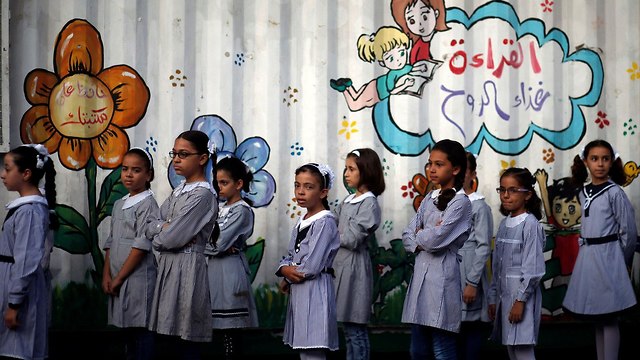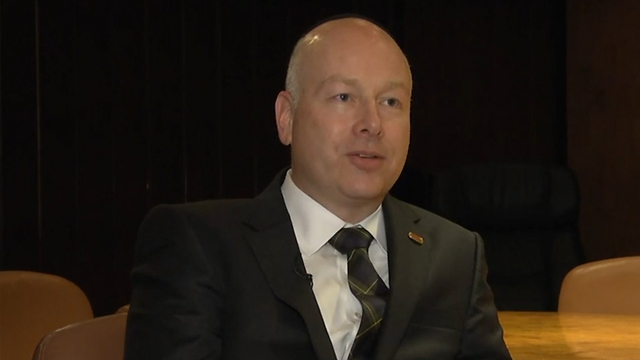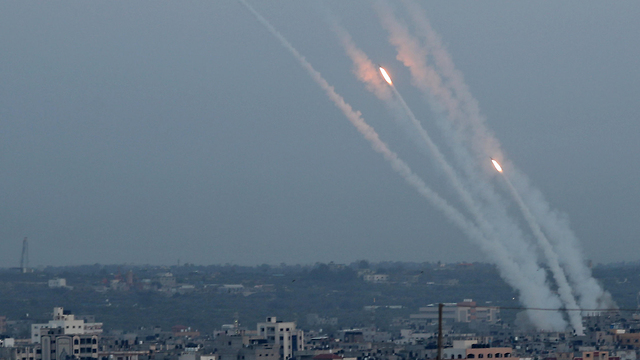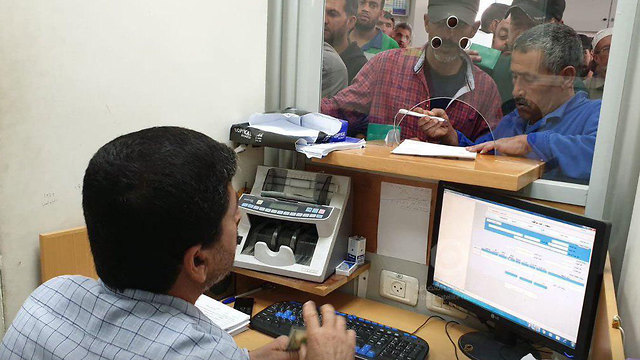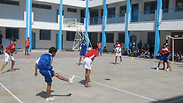
As UN budget dries up, Palestinian classrooms swell in size
The effects of U.S. aid cuts have rippled throughout UNRWA's operations, but its sprawling school system, serving 500,000 children across the Middle East, has been hit hardest, average class sizes in the West Bank have grown from 30 students a year ago to 50
This was a different stress. After the Trump administration slashed funding last year to the U.N. agency for Palestinian refugees, known as UNRWA, Jameel saw his classes nearly doubled in size.
His disciplined social studies class at the Hebron Boys' School had become a crowded, unruly scene: Four children squeezed at desks made for two, dozens of hands shooting in the air at the same time, noise snowballing when he paused for questions.
He said the classroom is louder and filled with distractions. "You spend most of the class time restraining student interactions or fights and have no time left to track their homework and classwork ... or give one-on-one help."
The effects of U.S. aid cuts have rippled throughout UNRWA's operations, but its sprawling school system, serving 500,000 children across the Middle East, has been hit hardest.
With money dried up and widespread austerity measures in place, the agency says it can no longer accommodate a natural influx of students, recruit new teachers or expand to larger facilities.
Peter Mulrean, the agency's New York representative, said average class sizes in the West Bank have grown from 30 students a year ago to 50.
"There's a huge difference between correcting exams for 27 students and for 47 students," said Jameel. "I just want things go back to how they were last year."
Students, too, say they've felt a major shift.
"It's been really hard for me to understand what's going on in class this year," said Suhail Jaber, a ninth-grader at the Hebron school. "If the teacher stops to explain things when we're confused, I feel class is suddenly over and I won't ever understand."
Ali Azazmeh, 10, said he's stopped even trying. "With all the heads in front of me I can't see the board anyway."
In early 2018, the U.S., which was UNRWA's biggest donor for decades, cut its contributions from $360 million to $60 million. In 2019, U.S. contributions are zero.
In a recent address to the U.N. Security Council, U.S. Mideast envoy Jason Greenblatt said the UNRWA model "has failed the Palestinian people."
"The UNRWA model cannot provide to Palestinians what they deserve -- a life where they can plan for their future and the future of their children, and one where they know whether schools and health clinics will remain open," he said. He called for "host governments" and other aid organizations to fill the void.
UNRWA was established in the wake of the 1948 Arab-Israeli War surrounding Israel's creation to aid the estimated 700,000 Palestinians who fled or were forced from their homes in the fighting. In the absence of a political solution, the U.N. General Assembly has repeatedly renewed UNRWA's mandate.

Today, the agency serves some 5 million Palestinians in the West Bank and Gaza Strip, as well as Jordan, Syria and Lebanon, who view it as a vital safety net, providing services that governments do not.
Symbolically, Palestinians see UNRWA as sustaining their core demand that refugees have the "right of return" to their lost homes in what is now Israel -- a prospect that Israel rejects.
Critics in the U.S. and Israel accuse the agency of perpetuating the conflict and promoting a culture of welfare dependency by maintaining an ever-growing population of refugees. Instead of working to resettle the refugees, critics say UNRWA allows refugee status to be passed down for generations, even in cases where they have gained citizenship elsewhere, such as Jordan.
UNRWA rejects the criticism, pointing out that refugees in other conflicts also maintain their status. It says it is carrying out a U.N.-mandated mission that reflects the will of the international community. The best way to solve the refugee problem, it says, is to find a political solution to the conflict that addresses the fate of the refugees.
After the U.S. cuts, an aggressive fundraising push hauled in major contributions from European and Gulf countries, which filled a $1.2 billion shortfall so that schools, health clinics and food distribution centers could stay afloat. But UNRWA is still reeling from the U.S. funding lapse.
"When you hear that we've maintained our programs and reduced our deficit, what you don't see is that the quality of our services is under threat," said Mulrean, noting that UNRWA has saved over $92 million last year in internal cuts. "There already wasn't much fat to cut. Now we're at the bone."
Beyond crowded classes, casualties of the cutbacks include layoffs to hundreds of part-time helpers and substitutes, intensifying pressure on overworked teachers who "now no longer have the luxury of getting sick, unless their colleague takes on an additional 50 students," said Tamara Alrifai, an UNRWA spokeswoman.
The agency also cut psychosocial counseling, adding to concerns that the neediest kids will bear the brunt of austerity, especially in Gaza, which has gone through repeated rounds of bloody clashes with Israel. UNRWA says 81% of Gazan children struggle in school due to conflict-related stress.
Long before the U.S. cuts, the school system in the crowded Gaza Strip had been vexed by an excess of kids and lack of buildings, the majority of which are shared in double or triple shifts. Since the spending freeze, a handful of students have been added to classes that already contained between 40-50 students, said Adnan Abu Hasna, the agency's media adviser in Gaza.
After the U.S. recognized contested Jerusalem as Israel's capital in December 2017, the Palestinians cut off ties with the White House.
The Palestinians believe the cuts to UNRWA, along with an end to hundreds of millions of dollars in other aid, are part of a broader U.S. effort to deal them a political blow.
Later this month, the White House is scheduled to unveil the first stage of its long-awaited Mideast peace plan at an economic conference in the Gulf state of Bahrain. The aim is to raise funds from wealthy Arab countries and other donors for large-scale investment in the Palestinian territories.
Palestinian politicians have rejected the forum's parameters, saying they won't give up their national aspirations in exchange for economic incentives.
In his address to the Security Council, Greenblatt noted the "irony" that the Bahrain conference had been scheduled for the same days as UNRWA's annual fundraising conference. "I acknowledge I have not brought with me today a solution," he said. "What we do know is that what we have today is not the answer."
But in the absence of answers, Mulrean said millions of Palestinians are suffering. "The U.S. has set a precedent, and at the end of the day, it's the most vulnerable people who pay the price," he said.










